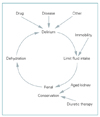Abstract
Aging is a universal biologic process characterized by a progressive, predictable, inevitable evolution and maturation of an organism until death. The increasing biomedical and psychosocial uniqueness of the elderly requires an individualized approach to their care. The conventional disease-specific approach is not optimal for elderly patients for several reasons. First, people aged 75 years suffer from 3~4 chronic diseases on average. Second, many distressing symptoms or impairments among elderly patients, such as pain, dizziness, fatigue, sleep problems, sensory impairments, and gait disorders cannot be ascribed to a single disease: instead, they result from the accumulated effects of physical, psychological, social, environmental, and other factors. Third, elderly patients vary in the importance they place on potential health outcomes. Three factors at least affect the clinical presentation in elderly patients: underreporting symptoms and impairments, changes in the patterns of presentation of individual illnesses, and an altered spectrum of health conditions. Clinical decision-making is further complicated in these patients because other persons, including the spouse, grown-up children, other relatives, and significant others, are often actively involved, particularly when the patient has cognitive impairment. The physician should understand clinical perspectives of aging and clinically relevant differences between young and old patients, including how elderly individuals behave when they are ill and how to interpret a changing constellation of multiple disease possibilities and interrelationships.
References
2. Hazzard WR, Blass JP, et al. Principles of geriatric medicine and gerontology. 2003. 5th ed. New York: McGraw-Hill Inc.;95–98.
6. Hazzard WR, Bierman EL, et al. Principles of geriatric medicine and gerontology. 1994. 3rd ed. New York: McGraw-Hill Inc.;195–201.
7. Fick DM, Cooper JW, Wade WE, Waller JL, Maclean R, Beers MH. Updating the beers criteria for potentially inappropriate medication use in older adults. Arch Intern Med. 2003. 163:2716–2724.

10. Rubenstein LZ, Wieland GD, et al. Geriatric assessment technology: the state of art. 1995. Milano: Editrice kurtis;1–40.




 PDF
PDF ePub
ePub Citation
Citation Print
Print









 XML Download
XML Download